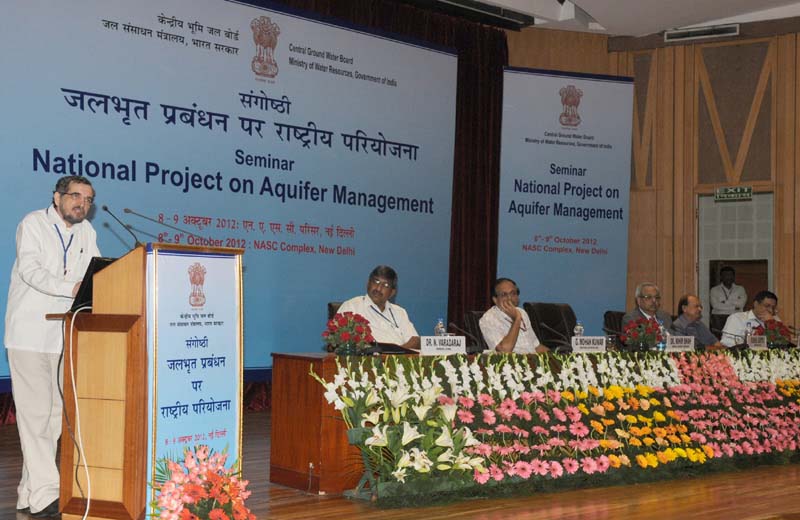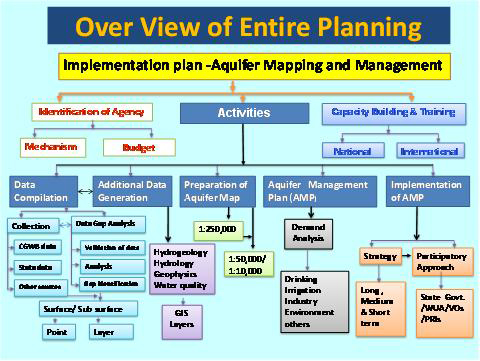
Inaugural session chaired by Dr. Mihir Shah
Image courtesy: www.readandknow.org
Groundwater is the backbone of India’s agriculture and drinking water security. Groundwater over-exploited areas and water quality vulnerable areas are being given priority in the twelfth plan. The National Project on Aquifer Management is being implemented in the twelfth plan and is likely to be continued in the next plan.
The National Project on Aquifer Management is designed as a significant step forward in groundwater resource management by identifying and mapping aquifers, quantifying the available groundwater resources potential and proposing plans appropriate to the scale of demand, aquifer characteristics and the institutional arrangements for management. It envisages revisiting aquifers by understanding them better through the aquifer mapping programme with a clear-cut forward link to participatory groundwater management.

Image courtesy: Central Ground Water Board
The seminar was inaugurated by Dr Mihir Shah, Member, Planning Commission. He stated that the programme would be a milestone in aquifer management in the country and would mark a paradigm shift in groundwater sector from development to management.
Shri G. Mohan Kumar, Additional Secretary, MoWR while addressing the issue of groundwater management emphasized the importance of groundwater in the growth of the economy and on people’s health. There is a need to adopt a futuristic strategy for management of groundwater and that is only possible through a scientific means entailing the development of aquifer map and management plan through participatory approach.
Shri Sushil Gupta, Chairman, Central Ground Water Board in his welcome address assured the house regarding the accomplishment of the responsibility given to CGWB for undertaking National Project on Aquifer Management. At the same time, he also requested all the related departments and agencies for their full support for timely completion of the project.
Three technical sessions were held during the two day seminar which was followed by a panel discussion. The panelists included Dr Mihir Shah, Member, Planning Commission; Shri G Mohan Kumar, Additional Secretary, MOWR; Dr D K Chadha, Ex-Chairman, CGWB; Shri S Samra, CEO, NRAA and Shri Sushil Gupta, Chairman, CGWB.
The recommendations of the seminar are presented below –
Technical Session I: Aquifer mapping and management - Implementation strategies, convergence and participation
The concept of National Project on Aquifer Management was deliberated and a broad consensus emerged for launching the project. The need to evolve state specific strategies for implementation of the project on a bottom up approach involving stakeholders was emphasized.
A need was felt for the creation of Special Purpose Vehicles (SPVs)/ dedicated cells at State level to steer the implementation of the project. The implementation of the project essentially requires a nodal department at the State level staffed with adequate manpower. The manpower in CGWB & State Groundwater Departments needs to be strengthened consequently. CGWB needs to interact with State Groundwater Departments for identification of the staffing requirements. MoWR needs to pursue all States to fill up vacant posts in ground water organizations on priority.
The possibility of providing a one-time grant for strengthening Groundwater Departments particularly in Participatory Groundwater Management (PGWM) may also be explored. State Government having Groundwater Departments and sufficient staff should be taken on board on priority. In States where Groundwater Departments are non-existent, other institutions working in groundwater domain may be involved in the implementation of project.
Technical Service Agency at national level will interact with State Level NGOs and guide them. They in turn will network with NGOs working at grass root level. Expertise of institutions like Tata Institute of Social Sciences (TISS) may be explored for imparting trainings to NGOs, Para Hydrogeologists etc. RGI will coordinate the training programme at National & State level on National Project on Aquifer Management.
Para hydrogeologists should be designated suitably like Jal Sewak/Water Monitors etc., after deliberations. A centralised database as also protocols for sharing of data needs to be developed at National & State level.
Technical Session II: Participatory approach to groundwater mapping and management
The experiences of participatory management in the States like Andhra Pradesh, Maharashtra and Gujarat by the Government Departments as well as other institutions may be utilised in finetuning the protocol of National Project on Aquifer Management project.
There is a need to develop a consortium of National NGOs to bring in connectivity between GoI, State Government & NGOs at grassroot level. A national document on infrastructure and training need assessment of professionals and NGOs in the groundwater domain may be prepared. Capacity building and skill upgradation for NGOs needs to be taken up on priority.
Technical Session III: Protocol for activities – Data compilation, data gap analysis, data acquisition and preparation of aquifer map
There is a need for standardisation of methodology & protocol for data collection, compilation, validation and interpretation. Establishment of data flow mechanism among stake holders is also required. The need was felt for benchmarking and technological upgradation of equipments and infrastructure in the implementing agencies. The application of advanced techniques including Heliborne geophysical surveys for aquifer mapping was also felt.
The programme concluded with a formal vote of thanks by Dr N.Varadaraj, Member (SAM) and organizing secretary.





 naquim_avanish_kant_mowr_presentation_2012.pdf
naquim_avanish_kant_mowr_presentation_2012.pdf







